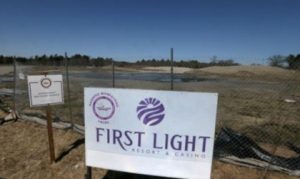The United States House of Representatives has reportedly passed two pieces of proposed legislation that would clear the way for the federally-recognized Mashpee Wampanoag Tribe to build a new casino resort on land the group owns in southern Massachusetts.
Trump delay:
According to a Wednesday report from The Hill newspaper, the initial vote by the 435-member body on House Resolution (HR) 312 and its associated HR 375 had been due to take place last week but was delayed after President Donald Trump unexpectedly issued a tweet expressing his opposition to the former measure.
The newspaper reported that Democratic leaders in the United States House of Representatives had decided to temporarily postpone these votes over fears that Trump’s unforeseen antagonism could endanger the two-thirds majority that is normally required to pass such measures and move them on to the 100-seat United States Senate.
Victorious votes:
However, yesterday’s eventual poll reportedly saw HR 312 pass through the Democratic-controlled U.S. House of Representatives by a vote of 276 to 146 while its accompanying HR 375 was later ratified via an even more assured 323-to-96 margin.
Countering controversy:
The Hill reported that HR 312, which is also known as the  Mashpee Wampanoag Tribe Reservation Reaffirmation Act, was proposed by a United States Representative from Massachusetts, William Keating, and seeks to end a 2016 legal challenge against the tribe’s efforts to have a 321-acre plot of land placed into trust by the federal government. Such a move, which is being supported by Massachusetts’ senior United States Senator, Elizabeth Warren, would purportedly allow the group to begin work in partnership with Genting Malaysia Berhad on its planned $1 billion First Light Resort and Casino near the small city of Taunton.
Mashpee Wampanoag Tribe Reservation Reaffirmation Act, was proposed by a United States Representative from Massachusetts, William Keating, and seeks to end a 2016 legal challenge against the tribe’s efforts to have a 321-acre plot of land placed into trust by the federal government. Such a move, which is being supported by Massachusetts’ senior United States Senator, Elizabeth Warren, would purportedly allow the group to begin work in partnership with Genting Malaysia Berhad on its planned $1 billion First Light Resort and Casino near the small city of Taunton.
Supreme standing:
The language of the supplementary HR 375 seeks to reaffirm the federal government’s right to place such pieces of land into a trust for the benefit of a tribe, which is a process that has been endangered as a result of the lawsuit brought against the plan from the Mashpee Wampanoag Tribe.
Reasonableness renewed:
During the debate on HR 312, Keating reportedly countered criticism from numerous Republicans by declaring that he had filed the measure in order to help ensure the economic future of the Mashpee Wampanoag Tribe and restore some justice to an aboriginal group that had been among the first to welcome European settlers to Massachusetts in the 17th Century.
Keating told his fellow legislators…
“I introduced this bill last Congress when we first heard rumors that the Department of the Interior was going to, for the first time, reverse the position of a previous administration and refuse to defend the Mashpee Wampanoag Tribe’s right to its historic land. It is the only tribe that has received recognition and then had it taken away. Now the tribe’s reservation is hanging by a thread and it has been left to defend its land on its own.”

Bi-partisan best:
Responding to yesterday’s passage of HR 312 and HR 375, the Chairman for the Tribe, Cedric Cromwell (pictured), reportedly told Boston radio station WBUR-FM that it had been ‘deeply humbling’ to see Republican and Democratic legislators ‘come together to save our reservation.’
Cromwell told WBUR-FM…
“Our tribe has suffered so much in the past from the United States’ failure to protect our land. Today, the United States House of Representatives acted to change that history and to help us take one step closer towards a better and more secure future for the Mashpee people.”



